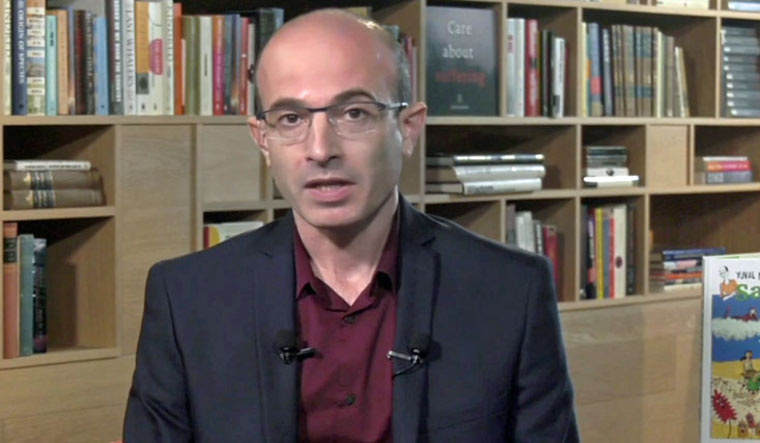Harari Warns Of Data Tyrants, Data Colonialism

Yuval Noah Harari warned that data colonialism could be among the biggest threats to humanity going forward (Pic: Facebook)
World-renowned author and public intellectual Yuval Noah Harari has warned of the perils of too much dependence on data-driven technologies because that can result in data colonialism, which will lead to the creation of tyrant governments and monopolistic corporations.
The Israeli writer, who shot to instant global fame with his three bestsellers — Sapiens: A brief history of humankind; Homo Deus: A brief history of tomorrow; and 21 Lessons for the 21st Century — is a public intellectual and historian and also a student of the Vipasana school of yoga, founded by the late S.N. Goenka.
The history professor at the Hebrew University of Jerusalem also admits that meditation is his biggest inspiration.
Addressing the Nasscom leadership summit online, he said history is not the study of the past but of the present, and how it is changing now.
Warning of data colonialism as among the biggest threats to humanity going forward, he said big data in the form of artificial intelligence and machine learning pose two big challenges to governments and public alike.
The two biggest problems with big data are at national and global levels. The danger on the national level is that a few groups — be they governments or large corporate monopolies — may use it to create unequal societies or totalitarian regimes, he said.
For the first time in human history, it is possible to follow everybody all the time and to know a person better than the person himself, he said, and pointed out that none of the past dictators and tyrants could do this because they did not have the required technologies.
The only way out is that we prevent such regimes and situations, Harari said.
The other danger is on the global level, wherein we may see new a kind of colonialism and imperialism taking shape in the form of data colonialism, he said.
In the past, one country could colonise others by just sailing in with their ships and soldiers; and then economically exploit those colonies, like what Britain did to India.
However, in the 21st century, one country need not send in its soldiers to conquer another nation; all it needs to do is take out the data of its leaders and its people, he said.
“Imagine a situation wherein China or the US has the entire personal records of a country’s politicians, journalists, judges, military leaders and begins to judge them by the jokes they crack and the diseases they struggle with. Then it will no longer be an independent country but a data colony,” Harari emphasised.
On the economic front, the danger is of harvesting all the data from everywhere across the world and if it is done by a private corporation, it can easily monopolise the sector it operates in, he observed.
For any deep-tech industry — be it machine learning or artificial intelligence — it is easy to colonise and the big challenge for all the countries is to prevent themselves from walking into these dangers, he said.
So the way forward is that every country should ensure that they do not allow any sort of data concentration as that is the highway to data colonisation.
Since there is an unprecedented level of data availability on each one of us, Harari said it has become much easier to manipulate people emotionally and intellectually.
This means that with the omnipresent data, a lot of very important decisions impacting our everyday lives are being taken by algorithms even as we do not understand their creators, the renowned author said.
For instance, one is applying for a job or seeking a bank loan. The decisions on both are not taken by human beings but algorithms.
Harari stressed that since algorithms take in thousands of data-sets to take decisions on a person, we are very close to the point where we not only lose control over ourselves but also lose our ability to understand the decisions that shape our lives.
A key principle to control data concentration and thus its misuse is that a government should never increase surveillance from top-down, but should use the same degree of surveillance on corporations and its officials as well, he said.
“So the way out is to have equal level of surveillance in a two-way manner. In short, technology should not be allowed to be used to collect data for control but for bettering each one’s lives.”
One of the biggest dangers of the future is that the earth will be dominated by super intelligent machines which have no consciousness, and this huge revolution is nothing but frightening, he said, adding that artificial intelligence has him most worried when it comes to tech innovation.





